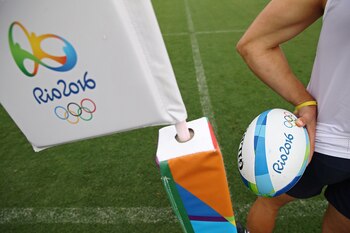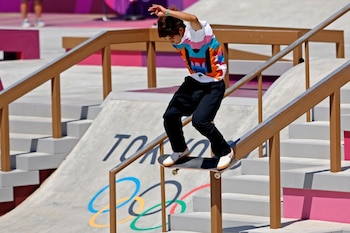
The decision to incorporate sports into the Olympic program is often surrounded by light and dark. Thanks and anger. Winners and losers. Celebrations and frustration.
It’s reasonable: for most disciplines, acquiring Olympic status represents an upgrade that is difficult to measure; it is breaking the shell of a microclimate that would never achieve an expansion close to what being one more produces in the universe of the rings.
Beyond the controversies and what each of us considers fair or unfair, in recent decades almost all the decisions that the IOC made in this regard had a fairly clear logic. Is it true that in some cases political influence can be placed among the most powerful motives — when wasn’t it? -, but at least since beach volleyball landed in Atlanta 96, the clearest common thread revolves around seducing new audiences, adding shows whose duration by segment does not turn a great match into something tedious, diversifying both the participating nations and those that finally access the podium and, especially, giving Olympism a facelift through competitions that contest the hegemony of extreme games or, to be more graphic and precise, adding sports that especially seduce young audiences.
3 x 3 basketball, freestyle bmx, surfing, skateboarding and, more recently, breaking are clear examples of this. By the way, the message that the IOC has been giving in this regard is clear and convincing based on the fact that most of these tests had their witness test at the YOGs, especially successful in their pre-pandemic version of 2018 in Buenos Aires. It wouldn’t be strange, along these lines, if we ever end up seeing, for example, a sprint version of the single scull en remo, as happened five years ago.

It is reasonable that many traditional sports - some even ancient - raise their voices as a sign of frustration. Some are still on the waiting list to achieve or regain Olympic status. Others get annoyed seeing how they are required to modify their rules or some characteristics to energize the show or make it more comprehensible and digestible before increasingly atomized audiences. To top it all off, some are beginning to feel the threat of E-Sports, although it’s hard to imagine virtual competitions within the conventional Olympic program (nothing would respond to the logic of Altius, Citius, Fortius). Perhaps the most sensible thing to do is to organize parallel and separate competitions. Anyway, that could be a topic for another discussion.
The concrete thing is that, at this point, I would not be encouraged to question any of the additions that the IOC made in the last 20 years. Not to mention the BMX race variant, whose only flaw is that the tests are too short. Read this reference as a further compliment to this formidable specialty.
In any case, part of the merit of those aspiring to join the games will be in finding the shortcut to adapt their best variant to the logic of these times: skills that are easy to understand for the virgin spectator, a variety of flags, little space to occupy in the calendar and in the rooms of the Olympic Village, an agile and noble spectacle.

Neither more nor less than the formidable work that rugby did to recover a standard that it had a century ago and in an almost testimonial way. There were four appearances in the version of fifteen with three participants in 1900 (France won), two in 1904 (Australasia won), two in 1920 and three in 1924, both won by the United States. The mere reference that in four editions it was only possible to bring together ten teams and not even the podiums were completed in two of those instances explains in part why the bond lasted a short time and we had to wait just under 90 years for reconciliation. Then there were two factors of enormous influence. One, the scandal that occurred when a group of French fans entered the field and attacked the North Americans after the defeat in Colombes. The other, the one that explains why the present is in reduced mode, the so-called rugby sevens. With a competition schedule that barely exceeds 16 days of the Olympic statute, it would be impossible to compete in a competition of fifteen with more than eight teams. Keep in mind that in the specialty world championship that will also be held in France this year, no team plays a match with less than four days off and, in some cases, in the initial phase there may be more than one week between one match and the next. We could also mention that the delegation of fifteen is more than twice that of the Sevens and that, while one modality in both genders does not occupy more than six days on the calendar, the other would not even be enough for a month.
By the way, rugby in a reduced version was one of those cases in which Olympism used the YOG as a guinea pig. The debut of the majors in Rio was preceded by the debut of the minors in Nanjing. And even though neither Brazil nor Japan - with great recent evolution but without distant precedents - are two powerhouses in the game, the two editions of Olympic rugby have been an undisputed success thanks to the agility of the show, the dynamics of the two-term games of just seven minutes and the level of excellence achieved by the main powers. Historically, this game was played by those who, in the game of fifteen, showed some combination of skill with their hands, speed and endurance. Today, rugby sevens has not only different rules than the original, but also specialists who do not usually practice both variants. The best example of this is the formidable show that took place on the world circuit that has just ended with a new success for the All Blacks.

One more detail of the circuit’s competitive excellence is the fact that powers such as South Africa, Ireland or Great Britain have not yet achieved the Olympic place that France, as host, and New Zealand, Argentina, Fiji (two-time Olympic champion) and Australia, have secured, by ranking. No minor detail: an almost hegemonic presence in the Southern Hemisphere among the best of the year.
As is the case with 3 x 3, beach volleyball or beach-handball -it debuts in Paris as an exhibition but has all the attributes to deserve official status in future editions-, rugby 7 also has its inclusive side: countries such as Kenya, Spain, Uganda or Germany, which hardly excel in tests of 15, find any stimulus in the small one and even some of them could occupy an Olympic place, as happened with the first two of the countries mentioned.
As a final suggestion. If you’ve never watched a rugby match or if, for whatever reason, it seems like a confusing battle of people piling up around a ball that doesn’t even sting in a predictable way, get rid of your prejudices and let yourself be carried away by a show that’s here to stay.
Últimas Noticias
Sinner-Alcaraz, the duel that came to succeed the three phenomenons
Table tennis: Brazil’s Bruna Costa Alexandre will be Olympic and Paralympic in Paris 2024

Rugby 7s: the best player of 2023 would only play the medal match in Paris

Rhonex Kipruto, owner of the world record for the 10000 meters on the road, was suspended for six years

Katie Ledecky spoke about doping Chinese swimmers: “It’s difficult to go to Paris knowing that we’re going to compete with some of these athletes”





